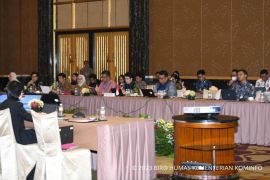The effort is being carried out to attract startup companies to expand their market to all regions of Indonesia, Digital Startup Coordinator at the ministry Sonny Sudaryana said during a webinar on “Bubble-Burst Phenomenon: Indonesia's Steep Path for Startups,” according to a press release received in Jakarta on Friday.
"The ministry will build 500 base transceiver stations (BTS), prepare fiber optic (cable networks) along 490 thousand kilometers connecting the eastern, central, and western regions, as well as maximize five national telecommunications satellites and four additional ones that we have leased," he said.
The ministry will also procure the Satria 1 Satellite, which will become operational in Q3 2023, Satria 2 in 2024, and Satria 3 by 2030, he added.
This is aimed at achieving uniform Internet distribution across the country.
Related news: Ministry pursues better Internet connectivity on Rinca Island
Regarding the bubble-burst phenomenon in the digital realm, he said that the situation faced by startup companies in Indonesia in the past six months is still at a normal level.
Bubble-burst is a phenomenon when economic growth or market value rises very quickly, especially asset prices, but is followed by a rapid decline in value or contraction.
In general, bubbles caused by rising asset prices are driven by high market behavior. The phenomenon has led a number of startup companies in Indonesia to stop operating and take steps, such as laying off employees.
Sudaryana said that the bubble-burst phenomenon is not threatening startups in Indonesia since their foundation is still good, and Indonesia has a smaller digital ecosystem compared with the United States, which has been hit harder by the bubble-burst phenomenon.
Another speaker at the event, managing partner of East Ventures, Roderick Purwana, said that the conditions experienced by startups in Indonesia have been due to many factors, including geopolitical crisis, namely the conflict between Russia and Ukraine, and the recovery process from the COVID-19 pandemic.
Meanwhile, CEO of Katadata Indonesia Metta Dharmasaputra said that the bubble-burst phenomenon that befell startup companies in Indonesia was part of Industrial Revolution 4.0.
Dharmasaputra reminded that the number of Internet users is expected to continue to grow, as based on data from Google Temasek, during 2015–2019 the population connected to the Internet increased by 100 million. During the two years of the pandemic, the number swelled by 80 million.
"Indonesia is estimated to become the largest digital player in Southeast Asia, the figure in 2020 was US$47 billion, and it reached US$70 billion in 2021. It is estimated that by 2025, the figure will reach US$146 billion. These figures bring a new point of optimism that the digital economy will continue to grow. Also proves that the bubble-burst phenomenon is not threatening," he added.
Related news: Gov't supports personal data protection, awaits law ratification
Translator: M Razi Rahman, Resinta S
Editor: Rahmad Nasution
Copyright © ANTARA 2022












